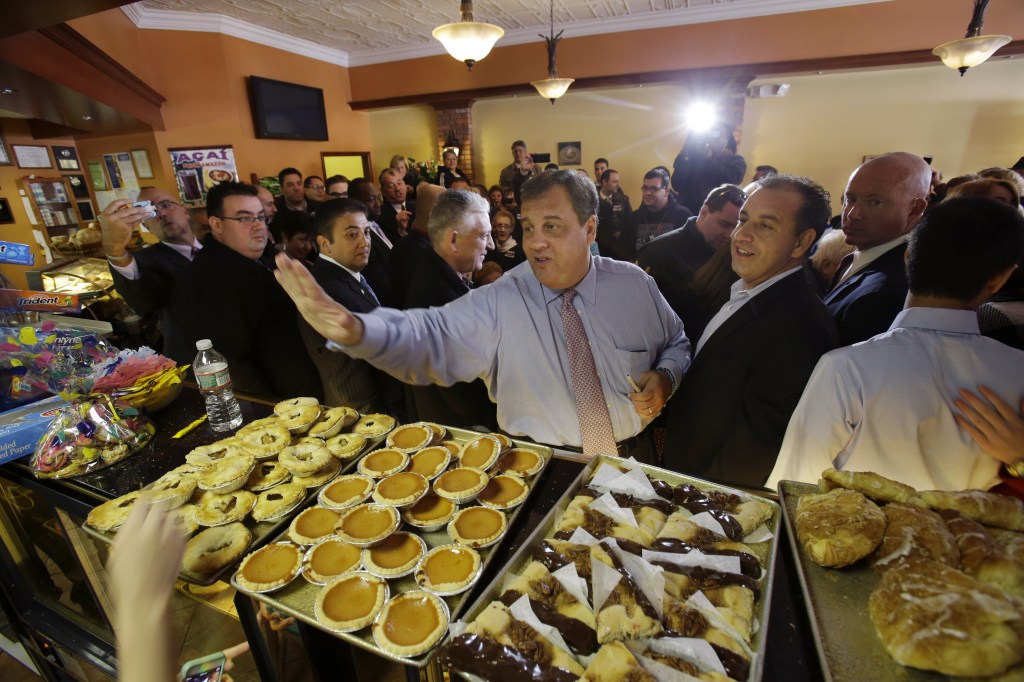TRENTON, N.J. — Gov. Chris Christie coasted to re-election even as voters split over whether the economy had gotten better or worse during his first term. Despite their concerns about the economy, voters said they still had confidence in the governor’s handling of it.
Christie dominated Democratic state Sen. Barbara Buono on Tuesday in an election that was never in doubt. With 99 percent of precincts reporting, Christie had 60 percent of the vote to Buono’s 38 percent, according to unofficial returns.
No Republican running statewide had reached 50 percent of vote since George H.W. Bush in 1988. Christie did it by expanding his support among a number of groups that Republicans traditionally find it hard to win over.
Interviews with voters as they left polling places found the 51-year-old governor was re-elected with support from 70 percent of whites, 61 percent of moderates, 66 percent of independents, and 61 percent of voters over 30.
But even though he lost among those younger than 30, they supported the governor by 13 percentage points more than in 2009.
He also saw double-digit increases in support from his election in 2009 from Democrats (an increase of 24 points), liberals (22 points), Hispanics (19 points), those without college degrees (14 points), suburban residents (14 points), those with household incomes under $100,000 (13 points) and blacks (12 points), exit polls showed.
The interviews were conducted for The Associated Press and television networks ABC, CBS, NBC, CNN and Fox News by Edison Research.
The tell-it-like-it-is governor, who is considering running for president, immediately began offering his success as a template for broadening the GOP’s appeal after the disastrous 2012 election cycle and the party’s record-low approval ratings following the recent government shutdown.
“We stand here tonight to show that it is possible to put doing your job first, to put working together first, to fight for what you believe in yet still stand by your principles and get something done for the people who elected you,” Christie said, instructing political leaders in Washington to “tune in their TVs.”
Christie was already popular when Superstorm Sandy slammed into the coast a year ago. His popularity soared as he donned a blue fleece pullover and led the state through its worst natural disaster, embracing President Obama in the days after the storm and touring the damage with Prince Harry months later.
The exit poll showed more than eight in 10 approve of the way he handled the problems caused by Sandy.
Fifty-nine percent said the economy is either not so good or poor and voters were divided over whether the state’s economy is either better or worse today than it was four years ago.
Buono edged Christie among those who feel the state’s economy is worse today than four years ago (54 percent to 43 percent) and ran even with the governor among those who said the condition of the state’s economy is not so good or poor.
However, 64 percent approved of Christie’s handling of the economy.
The exit poll of 2,468 New Jersey voters was conducted by Edison Research in a random sample of 40 precincts statewide. Results were subject to sampling error of plus or minus 3 percentage points.
Buono challenged Christie’s economic priorities during the campaign, criticizing his refusal to reinstate a surcharge on millionaires while trimming a tax credit for the working poor and refusing to fund women’s health clinics despite the availability of a generous federal match for every state dollar spent. Virtually none of her criticisms stuck, however, in part because she never raised the money needed for an effective advertising campaign.
In her concession speech about 45 minutes after polls closed, she took aim at the Democratic Party leaders who did not help her raise money or get out the vote.
“We took on the bosses and the political machine that have defined New Jersey politics for far too long,” she said. “The Democratic political bosses, some elected and some not, made a deal with this governor, despite him representing everything they are supposed to be against. They didn’t do it to help the state. They did it out of a desire to help themselves politically and financially.”
She wrapped up the campaign virtually on her own, as big-name Democrats stayed away.
Christie will soon take over as chairman of the Republican Governors Association, a position that will further raise his national profile and put him on the road more often. When he’s gone, Lt. Gov. Kim Guadagno, who ran on Christie’s ticket, will run the state government. The former Monmouth County sheriff is largely unknown.
During a debate less than a month ago, Christie admitted he might not serve out his full second term should he run for the White House.
New Jersey voters easily approved two ballot questions. One raises the minimum wage by $1, to $8.25 per hour, starting Jan. 1 and allows automatic cost-of-living increases based on inflation. The other allows veterans’ groups to use proceeds from Bingo and other games of chance for their operating expenses.
Voters returned incumbents of both parties to their seats in the Legislature, with Democrats on pace to retain control of both houses with a handful of races too close to call Tuesday night.
Send questions/comments to the editors.



Success. Please wait for the page to reload. If the page does not reload within 5 seconds, please refresh the page.
Enter your email and password to access comments.
Hi, to comment on stories you must . This profile is in addition to your subscription and website login.
Already have a commenting profile? .
Invalid username/password.
Please check your email to confirm and complete your registration.
Only subscribers are eligible to post comments. Please subscribe or login first for digital access. Here’s why.
Use the form below to reset your password. When you've submitted your account email, we will send an email with a reset code.